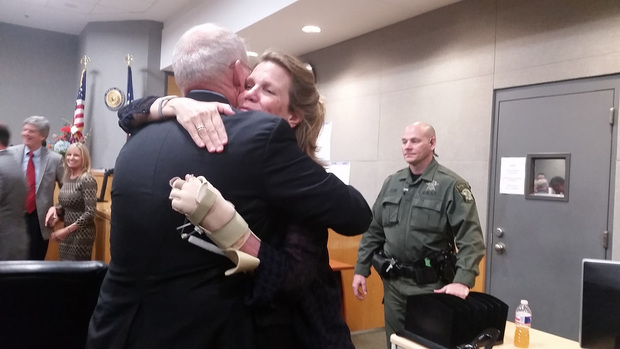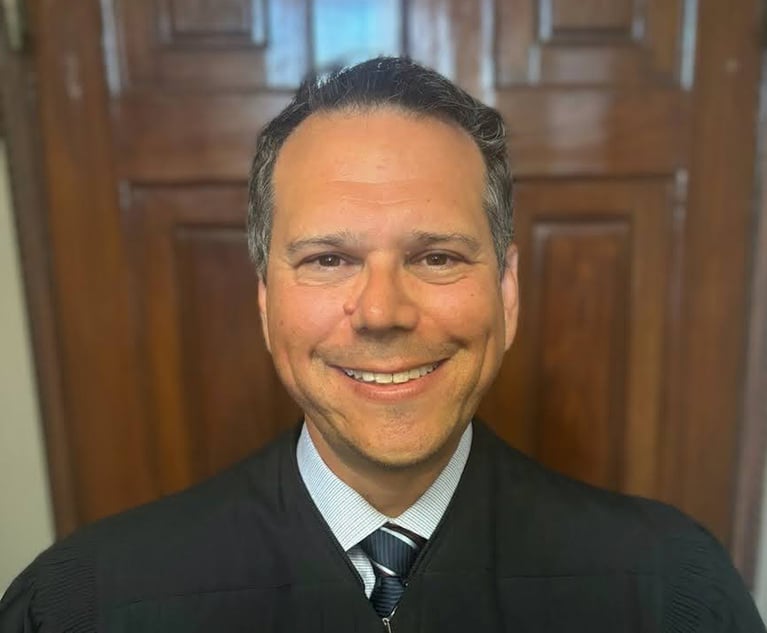Texas Judge Who Survived Assassination Attempt Shares Her Ordeal
" I try to find positive things out of it," 390th District Judge Julie Kocurek said. "It's made me as stronger, better person as a whole."
April 12, 2019 at 10:46 AM
4 minute read
The original version of this story was published on Texas Lawyer
 390th District Judge Julie Kocurek greets a supporter at a welcome back party on Feb. 29, 2016, the day she returned to her bench after her attempted assassination. Photo: Angela Morris/ALM
390th District Judge Julie Kocurek greets a supporter at a welcome back party on Feb. 29, 2016, the day she returned to her bench after her attempted assassination. Photo: Angela Morris/ALM
It's a story well-known to Texas lawyers and judges, but now this Saturday, people nationwide will learn how 390th District Judge Julie Kocurek of Austin survived a horrific shooting by a criminal defendant late at night in 2015.
“I scooted down as far as I could in the seat, and I protected my head with my arm and my hand. I can remember thinking, 'I am going to die in front of my own son,'” Kocurek says in a preview of an upcoming episode of the CBS News 48 Hours series, 'Live to Tell,' which airs April 13.
Watch the preview of 48 Hours, then scroll down for our talk with Kocurek about why she went on 48 Hours, how she's advocating for better judicial security and how her recovery is going.
[falcon-embed src="embed_1"]
Texas Lawyer: Your shooting was very traumatic, and I recall you were declining interview requests in the past. Why did you decide to open up to 48 Hours?
390th District Judge Julie Kocurek: The intent is to help with judicial security and highlight it on a national level and maybe inspire others to make change in a positive way for their judges. The trial is over and 48 Hours had been really persistent since the day it happened, and so eventually, I said I would do it if it was very factual and not sensational. I wanted the focus to be judicial security, and Justice Nathan Hecht, the chief of the Texas Supreme Court, helped me with that. He will be on it, too. I'm hoping other states will see this and do something about their judicial security.
You've done a lot to advance judicial security here in Texas. In fact, there's a law called the Judge Julie Kocurek Judicial and Courthouse Security Act of 2017. Can you tell me your role in that?
Kocurek: Four months after my incident, Justice Hecht called me and I went to his office, and we discussed all the issues I had run into. He said he's been trying to push a judicial security law since 2005 and he thought my incident would push it on through. He asked if I was willing to act. My son testified before the senate, and myself.
I was there on the day in 2016 that you returned to your bench in the 390th District Court. You were still wearing an arm brace and doing physical therapy. How have you recovered from your physical injuries since then?
Kocurek: I've lost a finger—my index finger—and my whole left arm is numb, but I can use it. I'm determined to get as much use out of it as possible. I'm lucky to have an arm. I'm lucky to have a life. It's a small price to pay.
I can't imagine the trauma emotionally and psychologically. How are you doing with that recovery?
Kocurek: Once this happened, I felt I was not going to get on the bench until I had undergone some therapy. Doctors and psychologists recommended a rapid eye-movement therapy. I did it for three years, up until the trial. At first I didn't know what it was–it sounded like hocus pocus to me–but it works, and there's concrete evidence. All of us are doing better. I am presiding over a murder case now, amazingly. In the beginning, I thought, 'How am I ever going to do my job again?' But with proper mental health treatment, it was possible. I try to find positive things out of it. It's made me as stronger, better person as a whole.
Read Texas Lawyer's coverage of Kocurek's shooting.
- District Judge Injured in Assassination Attempt
- Police Reveal Details, Seize Evidence in Judge Shooting Case
- 390th District Judge Julie Kocurek Resumes Bench After Assassination Attempt
- Three Indicted for Racketeering Fraud in Connection With Attempted Murder of Judge Kocurek
- Judge Kocurek Testifies Before the Senate State Affairs Committee to Support Security for Texas Jurists
- Houston Man Gets Life in Prison for Scheme Involving Attempted Murder of Austin Judge
This content has been archived. It is available through our partners, LexisNexis® and Bloomberg Law.
To view this content, please continue to their sites.
Not a Lexis Subscriber?
Subscribe Now
Not a Bloomberg Law Subscriber?
Subscribe Now
NOT FOR REPRINT
© 2025 ALM Global, LLC, All Rights Reserved. Request academic re-use from www.copyright.com. All other uses, submit a request to [email protected]. For more information visit Asset & Logo Licensing.
You Might Like
View All
Litigators of the Week: Simpson Thacher and ACLU Team To Challenge Louisiana's Ten Commandments Law

A Reporter and a Mayor: Behind the Scenes During the Eric Adams Indictment News Cycle

Even With New Business Courts, Texas Is a Long Way from Taking Delaware's Corporate Law Mantle
5 minute read
Trending Stories
- 15th Circuit Considers Challenge to Louisiana's Ten Commandments Law
- 2Crocs Accused of Padding Revenue With Channel-Stuffing HEYDUDE Shoes
- 3E-discovery Practitioners Are Racing to Adapt to Social Media’s Evolving Landscape
- 4The Law Firm Disrupted: For Office Policies, Big Law Has Its Ear to the Market, Not to Trump
- 5FTC Finalizes Child Online Privacy Rule Updates, But Ferguson Eyes Further Changes
Who Got The Work
J. Brugh Lower of Gibbons has entered an appearance for industrial equipment supplier Devco Corporation in a pending trademark infringement lawsuit. The suit, accusing the defendant of selling knock-off Graco products, was filed Dec. 18 in New Jersey District Court by Rivkin Radler on behalf of Graco Inc. and Graco Minnesota. The case, assigned to U.S. District Judge Zahid N. Quraishi, is 3:24-cv-11294, Graco Inc. et al v. Devco Corporation.
Who Got The Work
Rebecca Maller-Stein and Kent A. Yalowitz of Arnold & Porter Kaye Scholer have entered their appearances for Hanaco Venture Capital and its executives, Lior Prosor and David Frankel, in a pending securities lawsuit. The action, filed on Dec. 24 in New York Southern District Court by Zell, Aron & Co. on behalf of Goldeneye Advisors, accuses the defendants of negligently and fraudulently managing the plaintiff's $1 million investment. The case, assigned to U.S. District Judge Vernon S. Broderick, is 1:24-cv-09918, Goldeneye Advisors, LLC v. Hanaco Venture Capital, Ltd. et al.
Who Got The Work
Attorneys from A&O Shearman has stepped in as defense counsel for Toronto-Dominion Bank and other defendants in a pending securities class action. The suit, filed Dec. 11 in New York Southern District Court by Bleichmar Fonti & Auld, accuses the defendants of concealing the bank's 'pervasive' deficiencies in regards to its compliance with the Bank Secrecy Act and the quality of its anti-money laundering controls. The case, assigned to U.S. District Judge Arun Subramanian, is 1:24-cv-09445, Gonzalez v. The Toronto-Dominion Bank et al.
Who Got The Work
Crown Castle International, a Pennsylvania company providing shared communications infrastructure, has turned to Luke D. Wolf of Gordon Rees Scully Mansukhani to fend off a pending breach-of-contract lawsuit. The court action, filed Nov. 25 in Michigan Eastern District Court by Hooper Hathaway PC on behalf of The Town Residences LLC, accuses Crown Castle of failing to transfer approximately $30,000 in utility payments from T-Mobile in breach of a roof-top lease and assignment agreement. The case, assigned to U.S. District Judge Susan K. Declercq, is 2:24-cv-13131, The Town Residences LLC v. T-Mobile US, Inc. et al.
Who Got The Work
Wilfred P. Coronato and Daniel M. Schwartz of McCarter & English have stepped in as defense counsel to Electrolux Home Products Inc. in a pending product liability lawsuit. The court action, filed Nov. 26 in New York Eastern District Court by Poulos Lopiccolo PC and Nagel Rice LLP on behalf of David Stern, alleges that the defendant's refrigerators’ drawers and shelving repeatedly break and fall apart within months after purchase. The case, assigned to U.S. District Judge Joan M. Azrack, is 2:24-cv-08204, Stern v. Electrolux Home Products, Inc.
Featured Firms
Law Offices of Gary Martin Hays & Associates, P.C.
(470) 294-1674
Law Offices of Mark E. Salomone
(857) 444-6468
Smith & Hassler
(713) 739-1250






